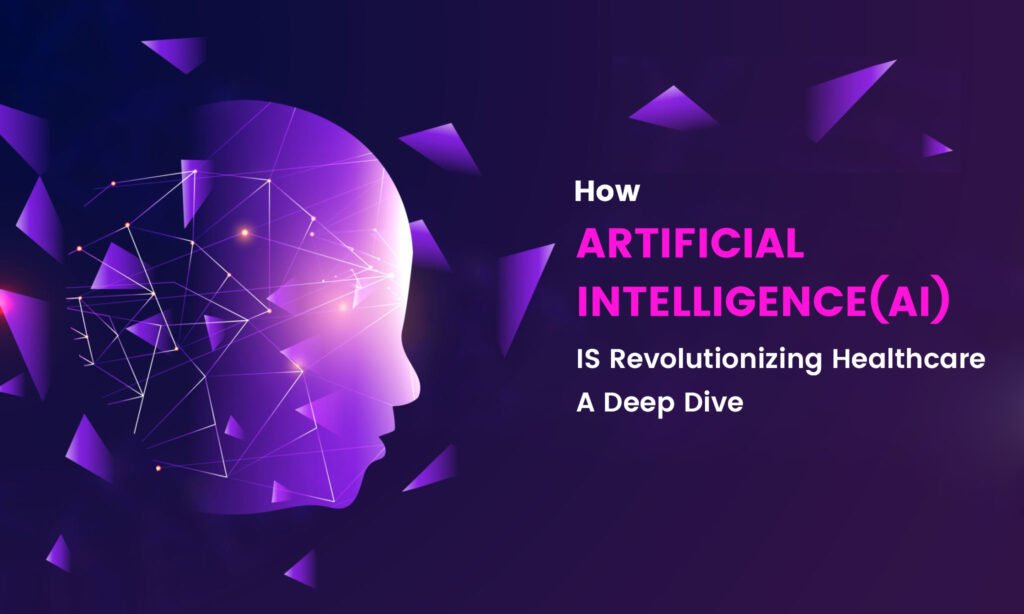
The healthcare industry is constantly evolving, and one of the most significant changes we are witnessing today is the adoption of Artificial Intelligence (AI). The use of AI in healthcare is revolutionizing the way we approach patient care and disease management. In this blog post, we will explore the benefits and challenges of AI in healthcare and discuss how a website designing company in Delhi can help healthcare organizations leverage this technology.
Benefits of AI in Healthcare
1. Improved Accuracy in Diagnoses
AI tools can analyze large amounts of patient data to identify patterns and make accurate diagnoses. This can help healthcare professionals to identify diseases at an early stage and provide timely interventions, improving patient outcomes.
2. Personalized Treatment Plans
AI can create personalized treatment plans based on patient data. This includes factors such as medical history, lifestyle, and genetic information. Personalized treatment plans can lead to better patient outcomes, as they take into account individual differences in response to treatment.
3. Improved Patient Engagement
AI can help healthcare providers to engage with patients more effectively. Chatbots, for example, can provide patients with information on their medical conditions and treatment plans, answer common questions, and even remind them to take their medication.
Challenges of AI in Healthcare
1. Data Privacy and Security
One of the biggest challenges of AI in healthcare is data privacy and security. Healthcare organizations must ensure that patient data is protected against unauthorized access, theft, or loss. A website designing company in Delhi can help healthcare organizations to build secure systems that comply with regulations such as HIPAA (Health Insurance Portability and Accountability Act).
2. Ethical Concerns
AI systems can make decisions based on algorithms and data analysis, which raises ethical concerns. For example, should an AI system prioritize treatment for a patient who has a higher chance of survival, even if it means neglecting other patients with lower chances? Healthcare organizations must ensure that AI systems are designed with ethical considerations in mind.
3. Integration with Existing Systems
Integrating AI systems with existing healthcare systems can be a complex process. It requires careful planning and coordination to ensure that the AI system can work seamlessly with other systems and provide accurate and reliable data.
In conclusion, AI is a revolutionizing technology that can transform the healthcare industry. By leveraging AI, healthcare organizations can improve the accuracy of diagnoses, create personalized treatment plans, and engage with patients more effectively. However, the adoption of AI in healthcare also comes with challenges, such as data privacy and security, ethical concerns, and integration with existing systems. A website designing company in Delhi can help healthcare organizations to overcome these challenges and build secure, ethical, and integrated AI systems.
Case studies
Case Study 1: AI-assisted Diagnostics
In a study conducted by researchers at Stanford University, an AI algorithm was trained to diagnose skin cancer by analyzing images of moles and lesions. The AI system was found to be as accurate as dermatologists in identifying skin cancer. This technology has the potential to improve the accuracy of skin cancer diagnoses, particularly in underserved areas where access to dermatologists is limited.
Case Study 2: Chatbots for Patient Engagement
The Cleveland Clinic has launched a chatbot on their website to provide patients with medical information and answer their questions. The chatbot uses natural language processing to understand patient inquiries and provide relevant responses. The Cleveland Clinic has reported that the chatbot has improved patient engagement and satisfaction, freeing up staff to focus on more complex patient needs.
Case Study 3: AI-assisted Surgery
In a study conducted by researchers at Johns Hopkins University, an AI system was used to assist in performing brain surgery. The AI system was able to identify the boundaries of tumors more accurately and efficiently than human surgeons. This technology has the potential to improve the outcomes of brain surgery and reduce the risk of complications.
These case studies demonstrate the potential benefits of AI in healthcare, from improving diagnostics to enhancing patient engagement to assisting in surgeries. However, it is important for healthcare organizations to address the challenges of data privacy and security, ethical concerns, and system integration to ensure that AI is used in a responsible and effective manner.
Future of AI in healthcare
The future of AI in healthcare is promising, with new applications and technologies emerging every day. Some of the areas where AI is expected to make significant contributions are:
1. Personalized care: With AI, healthcare providers can analyze patient data and develop personalized treatment plans that are tailored to each patient’s unique needs and medical history.
2. Drug discovery: AI can analyze vast amounts of data and identify patterns that could lead to the development of new drugs and therapies.
3. Remote monitoring: AI-powered devices can monitor patients remotely and alert healthcare providers if there are any changes in their condition, enabling early intervention and preventing hospital readmissions.
4. Virtual assistants: AI-powered virtual assistants can help patients manage their health and wellness by providing them with personalized advice and guidance.
Conclusion
AI has the potential to revolutionize healthcare by improving diagnostics, enhancing patient engagement, and assisting in surgeries. However, it is important for healthcare organizations to address the challenges of data privacy and security, ethical concerns, and system integration to ensure that AI is used in a responsible and effective manner. Working with a website designing company in Delhi can help healthcare organizations to overcome these challenges and build secure, ethical, and integrated AI systems that will benefit patients and healthcare providers alike.
Leave a Reply